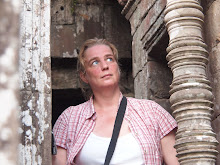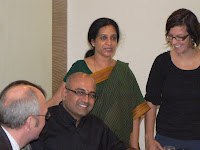Before I left, many of you asked me what I as an Financial Services Sector consultant in IT could do for a housing project in the slums of Ahmedabad. What would be my added value? To be honest, at that moment I was not sure myself either. I just knew that:
- it was part of a large programme for which participants were selected very carefully,
- others had encountered a similar challenging situation before with good results.
Now I know that I have a lot of qualities and skills with added value in a project like this which at first sight seems so different from my daily job. We often don´t realise how much we know/can do and how valuable our knowledge/skillset is, until we have to use that knowledge/skillset in a different setting. The different setting makes you more aware of what knowledge/skills you apply.
The main point here is that the knowledge about slums and incremental housing in slums is plenty available with the people on site. That is not what the client needed nor what he expected from us. The added value we (as IBM team) could bring was:
- to approach the situation from (a) different, fresh angle(s)
- a good sales pitch to get profit organisations (material suppliers) interested to enter this market
- research (perform survey data analysis and conduct interviews) to support the statements in the sales pitch and to validate the usability of the Hybrid Value Chain model.
- ... how to interpret the continuous head-nodding of Indian people (finally!). As they say, it can mean many things: yes, no, I don´t know, I know, I feel good, I feel bad, I agree, I disagree, I like this, I don´t like this or anything in between the dimensions mentioned before. Or it can even just mean nothing. The trick is to carefully monitor the eyes and facial expression and while doing so not to be distracted by the head-nodding. That seems to give a good indication of the meaning of the nodding.
- ... Indian people are just as curious about us as we are about them (e.g. while we were taking pictures of them with our cameras, they were taking pictures of us with their mobile phones)
- ... poverty does not need to lead to crime. In India many people are poor but it is a very safe country with low crime rate.
- ... although the atmosphere seems very quiet in India, it can suddenly explode without any notice (luckily I did not experience such an explosion). That is why there are so many security checks (for instance before entering a mall).
- ... cow dung is not unclean
- ... Indian people are very friendly and helpfull, no matter how poor
- ... the enormous amounts of people in India, continuously connected through mobile phones
- ... the crowded streets full of objects that are uncommon in the western world (camels, elephants, handcarts, rickshaws, cows, etc.)
- ... the resourcefullness and dedication of certain people and organisations to make life better for the poor
- ... also NGOs make poor people pay a small fee for services in order to ensure people take the services seriously (e.g. actually attend classes)
- ... arranged marriages (within caste) are still the standard in India. Love marriages are an exception and often requires a strong fight of the couple involved.
- ... there is a lot of domestic violence in India, both in slums as well as in the rest of India
- ... the ´landtitle´-issue is a big issue in India that really should be addressed in order to improve the situation for slum people. However, this can only be solved by the government and politicians have nothing to gain by solving this issue...
- ... in India religion is deeply integrated in daily life and although Brahma, Shiva and Vishnu are the main gods ther are many gods (108 I think?) and all of them can come in various forms so it all sounds pretty complicated
- ... the continuous honking of vehicles in the streets (´Horn OK Please´)
- ... drink the ´buttermilk with kardemom-seeds´. This is definitely an acquired taste, of which I decided on day one (after my first sip) that I should learn to appreciate. It took me quite some days and glasses before I finally managed to appreciate it ;-)


















